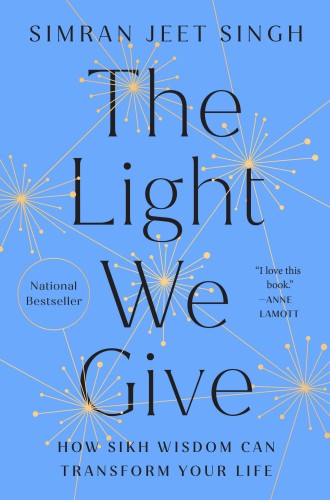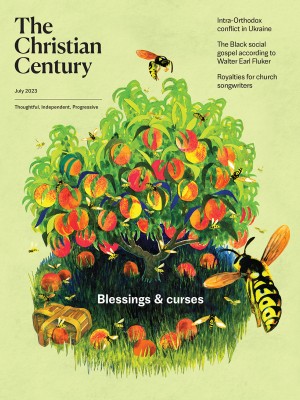I know that each person is more than the worst thing we’ve ever done—but we are also that worst thing, aren’t we? I kept asking myself this question as I read The Light We Give.
Educator and activist Simran Jeet Singh begins his memoir by recalling the racism he experienced as a “turban-wearing, brown-skinned, beard-loving Sikh” growing up in South Texas. He recalls distressing interactions with classmates and community members who discriminated against him based on his appearance, and he walks readers through the choices he made to navigate complicated feelings of anger, sadness, and fear. These choices led him to embrace positivity over negativity and to practice his Sikh faith more intentionally.
Read our latest issue or browse back issues.
Singh points to three major components of Sikhi (he uses the Punjabi noun, as opposed to the colonialist Sikhism) that have shaped his outlook: chardi kala, a teaching that imbues life with optimism and gratitude even amid pain and suffering; ik oankar, the concept that all people are created with a light of divinity within them, making everyone equal and worthy of respect; and seva, the practice of expressing love in all things, especially through service. He calls on readers to seek lives of active empathy, seeing each person—even those who are hurtful—as valuable and worthy of kindness and love. “When we identify our core values and commitments, and when we begin to put these into practice consistently, then we have set ourselves up to engage with the world around us in a way that is rooted not in our emotions and attachments, but in our principles and convictions.”
Singh describes as his greatest test of faith the aftermath of the massacre of seven Sikhs as they worshiped together in their gurdwara in Oak Creek, Wisconsin, in 2012. While grappling with his personal anger and sadness following the massacre amid his responsibilities as a public figure, he felt the need to speak to diverse audiences about the Sikh faith and the implications of hate for American society.
One of the most compelling sections of the book follows Singh as he travels to a summer camp to speak to Sikh children immediately after the massacre. When he asks the children if they know what happened there, a young girl responds, “A bad, bad man came and killed a bunch of us. He was evil.” Singh wrestles with how to respond because he finds something unsettling about naming Wade Michael Page, the shooter, as evil. He explains:
On the one hand, I preferred this framing because it helped make sense of a seemingly senseless massacre. But on the other hand, hearing a child say these words out loud revealed a truth that upset me. I took comfort in seeing him as evil. But I don’t believe in evil as a reality of our world, and I certainly don’t believe that people are evil. Damaged and destructive, yes. But evil, no.
Singh goes on to explain that Sikhi “teaches us to see every human being as equally divine and to reject the good-evil binary,” suggesting “that we are all inherently good and embodiments of God.” While it would be “emotionally easier” to respond to the children’s anger and sadness by dismissing Page as evil, Singh writes, doing so would dehumanize Page in a way that is ultimately unwarranted.
Singh’s reflections remind me of a theology I’ve often encountered in faith-based activism: the affirmation that every person enters this world created in God’s perfect image, and the bad things that we impose on each other after we’re born are betrayals of that image. Negative emotions—such as shame, anger, grief, and loneliness—are symptoms of those betrayals. These emotions, especially when combined with the idea of evil, have often been used to uphold the power structures that exploit the most vulnerable people in our communities.
In my experience, however, it’s hard to combat oppression without the spiritual resources to name where things have gone wrong and process our emotions about it. We all have the capacity and sometimes the impulse to do terrible things in the world—things that I, as a Christian, would call evil. Practicing our faith or ethical commitments on a daily basis is one way we can work on resisting those impulses. This is something that even children can learn from other people’s egregious acts.
My disagreement with Singh is, at its heart, a disagreement about what it means to be human. Singh desires to escape the good/evil binary because he believes that labeling Page as evil would be an act of “dehumanizing someone who had dehumanized us.” But I believe that our actions in the world reveal something real about who we are, and the full scope of our humanity includes our capacity to commit heinous acts. Naming that is just as important as recognizing our capacity to overcome those impulses and do good. When Singh reasons Page out of being labeled “evil” by the child at the camp, it feels to my Christian sensibilities like an act of dehumanization.
Singh’s conclusion that we all need to integrate ethical living into our public lives is admirable. He encourages readers to combat hate with love and empathy rather than perpetuating unhelpful patterns of disengagement and polarization. For those who are inspired to take on positive change but don’t know where to begin or how to articulate the impact of their faith on their worldview, Singh’s work is an excellent model. The Light We Give is not only an accessible introduction to Sikh wisdom, it’s a guide for all people who want to be better and do better.





